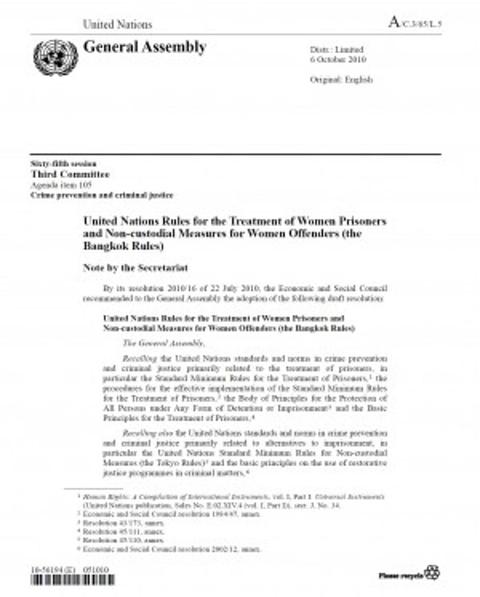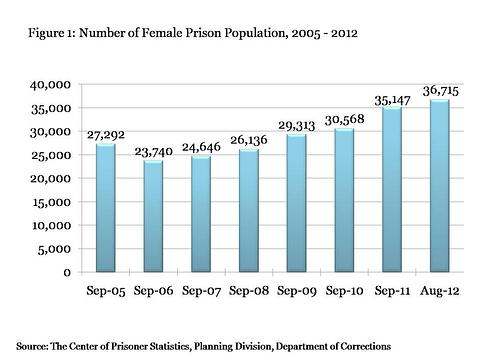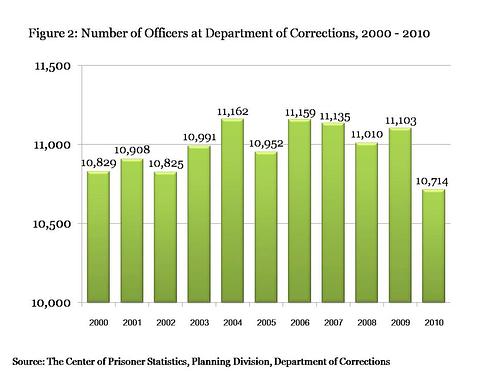Crucial Factors Facilitating the Implementation of Bangkok Rules in Thai Prisons
Crucial Factors Facilitating the Implementation of Bangkok Rules in Thai Prisons
Dr. Nathee Chitsawang
It was the first time that Thailand could perform the key role in successfully bringing about one of the United Nations standards and norms to be internationally recognized: ‘The United Nations Rules for the Treatment of Women Prisoners and Non-custodial Measures for Women Offenders’ or usually known as ‘The Bangkok Rules’. Basically, these rules should be adhered by all nations as a recommended guideline for the treatment of female prisoners in their own countries.

In Thailand, it could be said that the adaptation of the Bangkok Rules is still in the beginning phase. Although it is not officially compulsory for all countries to apply the rules, Thailand as the country originally proposing the United Nations Rules for the Treatment of Women Prisoners and Non-custodial Measures for Women Offenders which were approved by the 65th U.N. General Assembly, should be able to show its capability to become the role model for other nations in implementing all relevant measures and performing prison work in accordance with the rules as much as possible.
However, in order to effectively implement the Bangkok Rules it seems particularly complicated since there are various relevant factors which can lead to the success of the practical implementation. Therefore, I conducted a small study to explore the critical factors influencing the adoption of the Bangkok Rules in Thai prisons. The data were actually gathered from 200 female prison officers from four groups of different sessions who participated in the training program named: ‘Working by conforming to the United Nations Rules for the Treatment of Women Prisoners’ which was held at the Correctional Staff Training Institution, Department of Corrections. The participants had completed the questionnaires and then joined in a group discussion which in turn became the useful material for the qualitative data analysis. The study found that the crucial factors affecting the success of the Bangkok Rules implementation are as follows:
1. Prison overcrowding
The majority of prison officers stated that the overcrowding in prisons was the greatest obstacle to the adoption of the Bangkok Rules in Thailand. All prisons and correctional institutions for women in Thailand have been increasingly overcrowded. It should be noted that in reality, there are two types of correctional facilities for women prisoners: a women correctional institution or the prison for only female inmates; and secondly, a small female prisoner unit existed inside the same perimeter of men’s prison but clearly separated from each other. While the first type has the total of 8 women correctional institutions, the latter has 21: 7 large units and 14 small units for women inmates in men’s prisons.
As for the large women prisoner unit, it can range from 700-1,000 prisoners and the smaller one can detain approximately 300-700 inmates. The most severe overcrowded situation tends to happen in the small unit in men’s prison which its total capacity should be for only 50 - 70 female inmates. On the contrary, in practice it has been doubled to incarcerate about 100-300 women. As a consequence, the female prisoners have been imprisoned in a tiny space, without an area for taking physical exercise or doing other activities, such as the education and vocational training programs because the establishment was initially designed to imprison only a half of hundred people.
The point is that in a recent decade more women have entered into the vicious cycle of crime in particular those committed crimes against the Narcotics Laws. Currently, the drug-related female inmates are about 85 per cent of all female prison population. This trend has been gradually increasing year by year. The chronic problem is that the number of prison officers and prison facilities are still almost the same.

The opposite direction between the increasing female prison population and the understaffed situation together with the steady number of prisons totally tends to pose real difficulties in following many rules of the Bangkok Rules, especially about 20 rules regarding the medical service and the proper care for the children living with their mothers who are inmates in prisons.
Accordingly, the most necessary condition in implementing the Bangkok Rules in Thailand is that the number of women prisoners must be somewhat decreased by various possible alternative-to-prison measures. This idea is actually in the line with the Bangkok Rules which clearly support the proper use of non-custodial measures. At present Thailand had already amended the related laws which can facilitate the idea, particularly section 246 and section 89 paragraphs 1 and 2 of the Criminal Procedure Code indicating other places used to detain inmates instead of prison. In terms of the other measures, they should be more often adopted, such as probation and parole as well as temporary and conditional release by using the electronic equipment which can enhance the public confidence in the custody of prisoners in community. It is believed that if the number of female inmates can be decreased by these alternatives to prison, the Bangkok Rules will be more efficiently implemented. Hence, it is quite obvious that the most crucial factor in implementing the Bangkok Rules in Thailand is that the number of women prisoners must be decreased by various alternative-to-prison measures.
2. Actual situation and atmosphere in prison
The actual situation or atmosphere surrounded in prison is another crucial factor. This can refer to both specific atmosphere and current situation in each correctional facility, and also the overall atmosphere of all prisons or the prison system in the country. To give an example, when there are drugs and mobile phone smuggling prevention strategies, the experience and atmosphere in prison are entirely surrounded by the custody-oriented ambience and strict regulation. All correctional establishments tend to enhance the security measures by assigning most of their prison staff to conduct the thorough search at the main prison gate for visitors and vehicles and also inside the prison units to prevent the contraband smuggling. Consequently, other types of activities, i.e. education and vocational training, recreation and social welfare activities as well as the medical service and a good care of children staying with their mother inmates, have been rather limited or more strictly monitored. In other words, under this circumstance the operation in terms of the rehabilitation and other non-custodial activities including the implementation of the Bangkok Rules seem to receive little attention and get affected to some extent. For instance, according to the rule 28 it is indicated that:
‘Rule 28
Visits involving children shall take place in an environment that is conducive to a positive visiting experience, including with regard to staff attitudes, and shall allow open contact between mother and child. Visits involving extended contact with children should be encouraged, where possible.’
As previously discussed, under the circumstance that all prison visits must be strictly provided and the prison authority maintains custody-oriented atmosphere to prevent the smuggling of the contraband and all prohibited items into prison, it seems that the children who come to visit their mothers in prison cannot obviously gain a positive experience and even get physical contact with their mothers behind bars.
The possible solution for this issue might be that all prisoners should be appropriately and effectively classified. The good classification procedures shall be able to separate a group of dangerous prisoners, who pose high risks for causing troubles and disturbances, to be strictly kept in custody while another group of well-behaved inmates can be imprisoned in the facility which promotes the rehabilitation or creative activities, less custody-oriented atmosphere and hence can work in accordance with the Bangkok Rules.
3. The number of prison officers and the support from various sectors
The majority of participants in this study tended to agree that the adoption of the Bangkok Rules will not be successful if the prison authority cannot get adequately prepared in terms of the availability of manpower and the right attitudes of prison staff, although it is an official policy of the Department or even under direct orders from the prison directors.
As partly mentioned in the previous part that the shortage of prison officers has been the major obstacle of the Department of Corrections for the last ten years as the number of prison population, conversely, has been gradually increased from about 160,000 in 2003 to nearly 230,000 in 2012. In addition, the quantity of correctional establishments has risen from 125 to 143. As shown in the figure 1 below, the number of prison officers has not been proportionately added up because of the government policy to freeze the total number of civil servants in the public sector.

Although the Department of Corrections has tried to alleviate the shortage of prison staff by recruiting more government employees, there are still some legal limitations on the grounds that they are not legitimately regarded as civil servants. Therefore, according to all relevant laws and regulations, due to their status as government employees, they could not fully perform custodial work in prisons. In reality, it is very normal to see a small group of prison officers working in prison units comparing to the considerable number of prisoners. For example, in a large prison where many units are clearly separated there are about 1,000 inmates controlled and supervised by nearly 10 prison officers. It seems that each day prison officers can only perform their routine work particularly keeping all inmates in order without a possibility of escapes, riots and disturbances. They do not have enough time to do other rehabilitative activities for prisoners. For this reason, in order to deal with the staff shortage problem, most rehabilitation programs have been then provided by people from other agencies. Obviously, the understaffed situation can lead to some difficulties in working in accordance with the Bangkok Rules. To illustrate, one of the Bangkok Rules stated that:
‘Rule 13
Prison staff shall be made aware of times when women may feel particular distress, so as to be sensitive to their situation and ensure that the women are provided appropriate support.’
It must be noted that if the number of prison officers are still inadequate, it is almost impossible for the prison staff to be fully aware of times when the female inmates suffer the abovementioned distress as well as to provide active support in time as mentioned in the rule.
Moreover, the prison operation in accordance with the Bangkok Rules must be also derived from the cooperation from the prison officers working in other sections of prisons, as well as the clear policy of the prison executives. In order to provide the inmates with many rehabilitative programs and development activities, it seems that more officers from custody units or supervision section and other divisions must also engage in helping and facilitating the program events. Having said this, the prison officers in female prisoner unit usually have not gained full support because other officers tend to perceive that the assistance is rather an extra burden apart from their normal duty. Because of this, it is very important that all individuals behind bars must have the same attitudes towards the inmates and similar understanding as well as the explicit policy from the prison executives so that they all can work harmoniously towards the common direction.
4. Knowledge, understanding and the recognition of the importance of the Bangkok Rules
Another crucial factor influencing the dedicated work on implementing the Bangkok Rules is the knowledge, understanding and the recognition of the importance of the Bangkok Rules. It is believed that normally the prison officers, who have been working hard for a long time in the custody of inmates mostly causing troubles in prisons, tend to personally have a specific negative perspective on prisoners. To put it simply, this group of prison officers maintains that all prisoners cannot be changed in a positive way. In other words, no matter how many treatment programs provided by the prison authority, the prisoners will never be successfully rehabilitated. Hence, the rehabilitative activity is actually an unnecessary and burdensome task. This view could be largely found in some prison staff both male and female who have been working in the prison service and quite close to the inmates for a long time. The negative attitude is indeed a major obstacle for the implementation of the Bangkok Rules. Although these prison officers do not completely obstruct the running of the Bangkok Rules project, they choose to apparently ignore and do not provide any support. They just focus on their routine functions and pass the time each day without thinking of the effective results of their work.
This difficulty could be overcome by providing the prison officers with more knowledge and better understanding about the concept and ideology of the treatment of female prisoners in accordance with the Bangkok Rules. Furthermore, it should be noted that many prison staff still do not have enough profound knowledge of the Bangkok Rules which in turn leads to the lack of support and dedication to the adoption of the rules. For instance, some male prison officers or even the female officers, who do not have official duty in adopting the rules, do not provide enough assistance or are not willing to give support. Accordingly, it appears seemingly inevitable to provide them with the complete knowledge of the advantages and the significance of the implementation of the Bangkok Rules.
5. Motivation in prison officers
According to the questionnaires and the group discussion of the participants, the majority of them suggested that the personal motivation was very important. It should be highlighted that to work in accordance with the Bangkok Rules can be accomplished successfully by the strong motivation of the practitioners, not because of the perception that it is the demanding task that they must fulfill. As already discussed that the shortage of prison staff has continuously existed, the prison officers have to work very hard around the clock. In each unit, there might be only 3 – 10 officers managing about 100 prisoners. Most of their daily working hours are usually spent on completing routine and repetitive missions. Therefore, to assign the correctional officers under the new and challenging duty must be extremely motivated. By doing so, it is very necessary to highlight the real benefits of this project for the development of correctional work in Thailand which can be greatly improved to the international standard. If it succeeds, all practitioners taking part in the adoption of the Bangkok Rules will be truly honored and appreciated for their work. Also the officers who are dedicated and devote a great deal of effort should be well paid off and properly rewarded so that they will gain great inspiration and encouragement to keep working further.
In Thailand, last year the prison officers at practitioner level from Ratchaburi Central Prison had an opportunity to do a study tour in Singapore as it was a prison achieving the most remarkable progress in the implementation of the Bangkok Rules. In case of other prisons, there might be different types of motivation and reward namely the promotion in job, the chance to receive special training, the scholarships to study or to be trained, and the study or exchange visit, etc. Although there is a wide range of motivation, it is very necessary for the prison officers to be well motivated in order to succeed in adopting the Bangkok Rules.
Conclusion
To sum up Thailand, as the leading nation in proposing the Bangkok Rules or the United Nations Rules for the Treatment of Women Prisoners and Non-custodial Measures for Women Offenders, must perform a major role in supporting the implementation of the rules worldwide. Having said this, firstly Thailand must be able to work in accordance with the rules in our own country which tends to primarily rely on five abovementioned factors analyzed from the questionnaires and group discussion of female prison officers (practitioner level) in different prisons and correctional institutions all over the country. It is hoped that these findings could be regarded as a guideline for other countries in order to overcome their own nations’ difficulties or to focus on their key factors which can help them to succeed in the implementation of the Bangkok Rules.
ความเห็น (0)
ไม่มีความเห็น